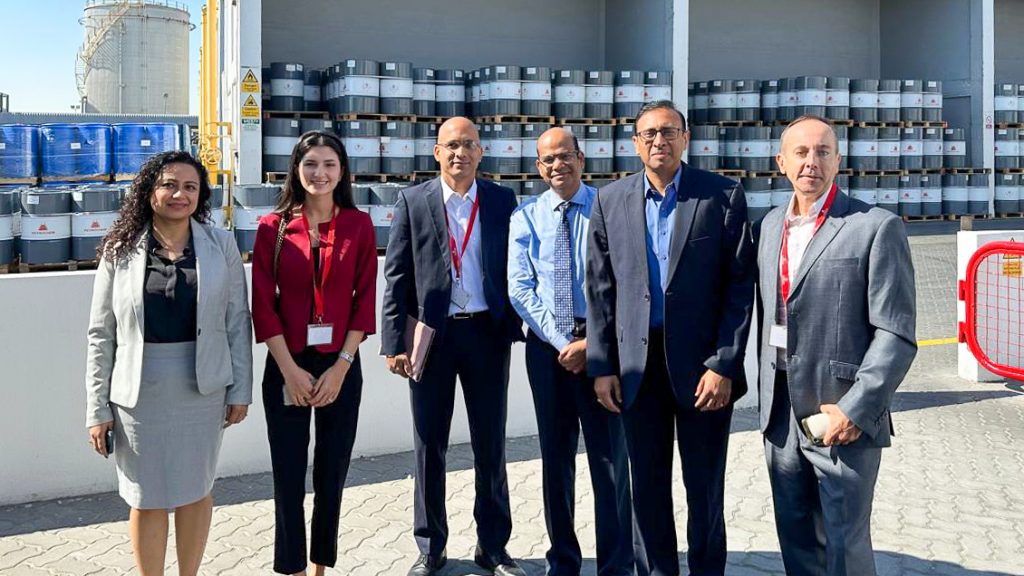Building a Sustainable Future Together: Petrochem’s ESG Journey with Living Business

Today, sustainability isn’t just a trendy term; it’s a requirement. Companies are increasingly recognizing the importance of environmental, social, and governance (ESG) strategies. Petrochem, a leading chemical distributor in the Middle East and Africa, has embarked on a comprehensive ESG journey with the support of Living Business. This article explores the collaboration between Petrochem and Living Business, highlighting the development of DEI and CSR policies, the measurement of emissions, and the ongoing work on their ESG strategy and report.

Petrochem: A Global Leader in Chemical Distribution
Established in 1995 in the United Arab Emirates, Petrochem has grown into the largest chemical distributor in the Middle East and Africa. With operations in multiple countries and a state-of-the-art terminal in Dubai’s Jebel Ali Free Zone, Petrochem handles a wide range of chemicals, ensuring safe and efficient operations. The company is ISO 9001, ISO 14001, and ISO 45001 certified, demonstrating its commitment to quality, health, and safety.
The Drive for DEI and CSR Policies
Petrochem has always been at the forefront of the industry, striving to include all stakeholders in its operations. Dharmendra Gupta, Petrochem’s Financial Controller, explains, “For us, diversity, equity, and inclusion (DEI) and corporate social responsibility (CSR) are part of our DNA. It’s crucial to have a diversified workforce and include different stakeholders in our decision-making process.”
Collaborating with Living Business
The collaboration with Living Business began in November 2023, facilitated by the National Bank of Fujairah, the official partner of the Living Business program that year. Dharmendra recalls, “We were excited about the opportunity. Keith and Nigar from Living Business visited our operations site and helped us put together a comprehensive policy framework for DEI and CSR.”
Developing DEI and CSR Policies
The development of DEI and CSR policies was a detailed process. Dharmendra explains, “Keith and Nigar conducted several interviews and team meetings, guiding us in creating a multidisciplinary committee. This inclusive approach helped us gather ideas from various departments, which Living Business then structured into a coherent framework.”
Challenges and Overcoming Them
One of the key challenges was documentation. “We were doing a lot of good work, but it wasn’t documented properly,” says Dharmendra. “Living Business helped us put everything into a structured format, making it easier to monitor and measure our progress.”
Measuring Scope 1, 2, and 3 Emissions
Measuring emissions is a crucial part of any ESG strategy. Petrochem, under the guidance of Living Business, started measuring Scope 1 and 2 emissions, which include direct emissions from owned or controlled sources and indirect emissions from the generation of purchased electricity. Dharmendra notes, “Living Business provided us with the necessary tools and calculators to accurately measure these emissions, which brought more awareness to our management meetings.”
Scope 3 Emissions: A New Challenge
Scope 3 emissions, which include all other indirect emissions that occur in a company’s value chain, posed a new challenge. Dharmendra explains, “This was something new for us, but Living Business guided us through the process. They provided calculators and helped us conduct surveys to gather data, making it easier to include these emissions in our reports.”
Creating Awareness and Engagement
Creating awareness among employees was a significant achievement. Petrochem conducted surveys to understand employees’ commuting patterns and their ideas for reducing emissions. “We received some wonderful ideas from our employees, which showed their commitment to our sustainability goals,” says Dharmendra.
The ESG Strategy and Report
Currently, Petrochem is in the materiality phase of developing its ESG strategy and report. The company has chosen to align its report with the Global Reporting Initiative (GRI) and the International Financial Reporting Standards (IFRS) S1 and S2. “We are excited to complete our first ESG report this year, even though we are not regulated to do so,” Dharmendra shares.
Importance of ESG Strategy
An ESG strategy is vital for companies like Petrochem. Dharmendra believes, “Having an ESG strategy helps us stay ahead in the industry. It’s not just about compliance but about setting an example for others to follow. It helps create a ripple effect, where our customers and suppliers also start adopting sustainable practices.”
Future Plans and Recommendations
Looking ahead, Petrochem aims to achieve net zero emissions. Dharmendra emphasizes the importance of taking the first step, “It’s crucial to have sustainability as part of your company’s DNA. Once you take the first step, everything else falls into place.” He advises other companies to start by developing health and safety practices and then gradually integrate broader ESG goals.
Experience with Living Business
Dharmendra praises the collaboration with Living Business, highlighting their responsiveness and understanding of the business. “They listened to us, guided us, and helped us at every step. Their approach made the entire process smoother and more effective,” he says.
Conclusion: A Journey Towards Sustainability
Petrochem’s journey towards sustainability, supported by Living Business, showcases the importance of collaboration, structured frameworks, and continuous improvement. By developing comprehensive DEI and CSR policies, measuring emissions, and working on an ESG strategy, Petrochem is setting an example for the industry. This journey reflects the company’s commitment to creating a sustainable future and highlights the vital role of partnerships in achieving these goals.
By sharing their experiences, Petrochem hopes to inspire other companies to embark on their own sustainability journeys. The impact of such initiatives extends beyond individual companies, contributing to a more sustainable and responsible industry as a whole.
Related Posts


